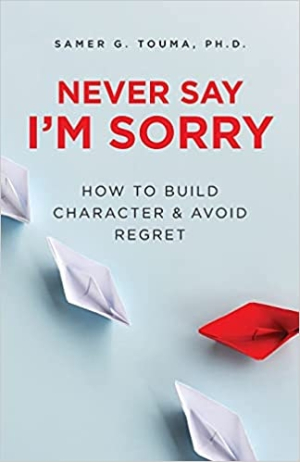Never Say I’m Sorry
Never Say I’m Sorry is a self-help resource concerned with the development of good behaviors and practices.
Samer G. Touma’s direct, enlightening self-help book Never Say I’m Sorry argues that a life of meaning begins with building good character.
The book opens by acknowledging that everyone has regrets, and by asserting that no one is perfect. People may be prone to bad and poor behavior, which leads to regrets; and some are unable to forgive themselves and others. But against the depression and other mental health issues that can arise from such hang-ups, this book declares that, no matter what has happened in one’s past, regrets don’t have to weigh people down. Instead, Touma encourages the acknowledgement, acceptance, and embracing of what people have done or had done to them; such work, he says, builds character, which can be leveraged to gain personal freedom and achieve more satisfaction in life.
This is an unusual self-help book with a minimalist format, absent navigational information, sidebars, graphs, and images. Its intimate work is organized into six chapters; it first outlines what character is before delving into components of character, like respect, forgiveness, and honor. Such components are explored via anagrams, with each letter standing in for a subvalue—“honor,” for example, comes to encompass hope, openness, nobility, obligation, and rank. These subvalues are further explored in standalone sections of the book. Easy reviews of the material are enabled by these breakdowns.
The book’s quick dives into the components of character are provocative, adopting tones that are both familiar and frank. It seeks to be direct when it comes to explaining why some behaviors, like complaining, might be deemed unhealthy. Throughout, it encourages self-reflection and the constant reevaluation of one’s life strategies. Personal anecdotes are used to bolster this fast work, used to show that having character is important, and not about perfection, but rather processes.
In this quite short text, the writing is crisp and concise. This leads to outward accessibility, though the book also eschews formality in the process; there’s nothing academic or clinical about its work. It preferences quick explorations of its named components of personal character above all else, aiming to facilitate personal improvement—all with the knowledge that good character can be challenging to develop.
Never Say I’m Sorry is a self-help resource concerned with the good behaviors and practices that contribute to healthy character building.
Reviewed by
Katerie Prior
Disclosure: This article is not an endorsement, but a review. The publisher of this book provided free copies of the book and paid a small fee to have their book reviewed by a professional reviewer. Foreword Reviews and Clarion Reviews make no guarantee that the publisher will receive a positive review. Foreword Magazine, Inc. is disclosing this in accordance with the Federal Trade Commission’s 16 CFR, Part 255.

